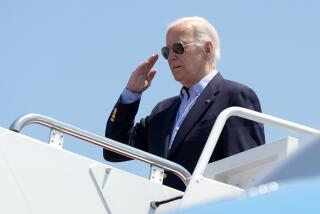Pointing Out Kerry’s Reluctance on Iraq May Spotlight Bush’s Rigidity
- Share via
There’s something kamikaze about the past week’s skirmishing between President Bush and Sen. John F. Kerry over Iraq.
By challenging Kerry to say whether he too would have invaded Iraq, Bush has targeted what may be Kerry’s greatest weakness with voters: a reputation for vacillation and hairsplitting.
But Bush simultaneously may be spotlighting what many voters like least about him: a reluctance to change course even amid changing circumstances and a belief in his own decisions so unwavering that it straddles the line between confidence and arrogance.
Bush began the exchange this month when he introduced new language into his stump speech unequivocally defending his decision to invade Iraq even after the failure to find weapons of mass destruction and challenging his Democratic challenger to say whether, as president, he would have done the same thing.
“There are some questions that a commander in chief needs to answer with a clear ‘yes’ or ‘no,’ ” Bush said during a campaign stop in New Hampshire. “My opponent hasn’t answered the question of whether, knowing what we know now, he would have supported going into Iraq.
“I have given my answer,” Bush continued. “We did the right thing, and the world is better off for it.”
In posing this question to Kerry so starkly, Bush is jabbing at a vulnerable spot.
In his stump speech, the Massachusetts senator implies that he would not have invaded Iraq when he declares that under his administration America will “never go to war because we want to, we’ll only go to war because we have to.” And Kerry has often said he believes Bush did not need to invade so quickly before devoting more time to assembling international support or planning for postwar reconstruction.
But Kerry hasn’t definitively said whether he would have sent in the troops at a later date under different conditions. James P. Rubin, one of his top foreign policy advisors, caused some consternation in the campaign a few days ago when he said that if a long list of requirements had been met -- including passage of a U.N. resolution explicitly authorizing the war -- Kerry “in all probability” would have invaded Iraq as president.
Kerry hasn’t been that explicit. In a recent interview, he rejected the argument from William F. Buckley, the conservative eminence grise, that any president presented with the information on Bush’s desk at the time would have invaded Iraq.
“Not at that moment,” Kerry said. “You might have come to the point where you might have made that decision. But the information that was on the president’s desk wasn’t even accurate, and some people knew that at the time.”
Kerry was finally asked about Bush’s challenge during a campaign stop last week. He said that, even with everything that had happened in Iraq, he still would have voted to give Bush the authority to invade. That didn’t break new ground. Kerry has long argued that it was appropriate to provide Bush with the authority to invade -- whether or not he used it -- to give him more leverage in demanding that the United Nations resume weapons inspections in Iraq.
But pointedly, Kerry did not repeat Rubin’s language that as president, “in all probability” he would have ordered an invasion too.
Bush immediately took Kerry’s words as an endorsement of his decision to go to war. In fact, Kerry only reaffirmed the legislative decision to provide Bush with authority for war. Kerry didn’t say whether, as chief executive, he would have followed Bush in exercising that authority.
Kerry advisors say the hypothetical question is impossible to answer unequivocally because so many variables are involved. But for many Americans, no question is probably more relevant to judging Kerry as a potential president than whether he would have gone to war in Iraq. By leaving his response vague, Kerry leaves himself open to Republican charges that he’s not leveling with the public or showing decisiveness.
“You’ve got a situation where the Democratic candidate for president is refusing to take a straightforward position on arguably the single most important issue in the election,” said one GOP strategist familiar with White House thinking.
This line of argument has created enough problems for Kerry that both sides say they can imagine Bush reprising it during this fall’s debates. If he does, Kerry will probably need a sharper answer than he offered last week.
But this offensive carries significant risks for Bush, as well. After the failure to find weapons of mass destruction, the persistence of resistance to the American presence in Iraq and a U.S. casualty count marching toward 1,000, many voters have had second thoughts about the war.
By reaffirming his decision so emphatically, Bush is poking a stick at roughly half of the public that now says in polls that they believe the war was a mistake.
The Bush camp believes the president is showing the determination many prize in a leader: In effect, they are hoping to win votes by separating his decision-making process from the decision the process produced.
But if Bush is utterly unfazed by all that has happened in Iraq, some voters might wonder if he will be too quick to try something like it again. And by refusing to acknowledge any second thoughts, the president also risks reinforcing the impression that he’s too dogmatic to adjust to changing circumstances. Wouldn’t the events of the last 15 months in Iraq cause any reasonable person some doubts?
This latest argument over Iraq hasn’t displayed either contender to his best advantage. Kerry has seemed too reluctant to take a firm position, while Bush has seemed too reluctant to reconsider one. Both appear to have forgotten that great leaders combine resolve and flexibility. In picking a president, Americans shouldn’t have to choose between the two.
Ronald Brownstein’s column appears every Monday. See current and past columns on The Times’ website at latimes.com/brownstein.
More to Read
Get the L.A. Times Politics newsletter
Deeply reported insights into legislation, politics and policy from Sacramento, Washington and beyond. In your inbox twice per week.
You may occasionally receive promotional content from the Los Angeles Times.








